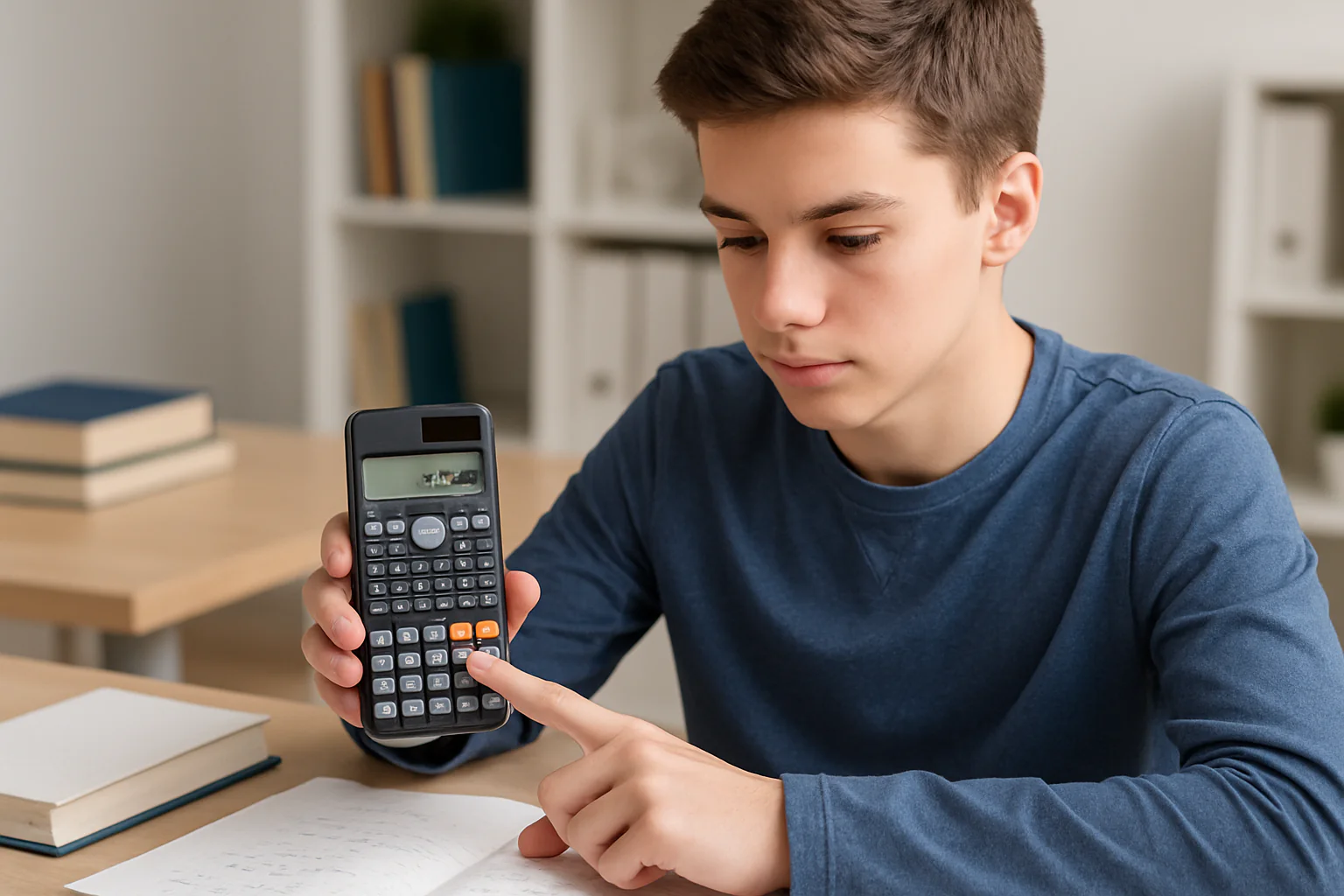Overcoming Math Anxiety: Proven Strategies
Overcoming Math Anxiety starts with small, consistent wins. This article shares practical techniques to calm the stress response, rebuild confidence, and turn math practice into steady progress you can feel.
Overcoming Math Anxiety: Proven Strategies to Build Mathematical Confidence
Math tests make your heart race. Your hands sweat. Your mind goes blank. The problem you understood yesterday looks like gibberish today. This is math anxiety. It is real. And it is fixable.
I failed Algebra II twice. Not because I was bad at math. Because my brain panicked every time I saw numbers. Twenty years later, I teach data analysis. The difference was not getting smarter. It was learning to manage the fear.
Math anxiety is not about intelligence. Smart people have it too. Engineers who panic at restaurant bills. Accountants who freeze during mental math. The fear and the ability are separate things. Once you understand this, everything changes.
Why Your Brain Hates Math

Bad Teachers Leave Scars
One teacher can ruin math forever. They make you solve problems on the board. They sigh when you get it wrong. They say things like "this should be easy by now." Your brain remembers. It files math under "danger."
These moments stick. One wrong answer in front of the class. One laugh from other students. Your brain decides math equals humiliation. Years later, you still feel it. Even though that teacher is long gone. The fear remains.
Speed Tests Create Panic
Remember timed math tests? Sixty seconds to solve 100 problems. These create anxiety, not math skills. Some kids freeze under pressure. They know the answers. But the timer destroys their thinking.
Real math has nothing to do with speed. Engineers take hours on problems. Scientists check their work multiple times. But schools teach that fast equals smart. Slow equals stupid. This is wrong. And it creates lasting damage.
Missing One Thing Ruins Everything
Math builds on itself. Miss one concept and everything after breaks. You get sick for two weeks. Miss fractions. Now decimals make no sense. Percentages are impossible. Algebra is gibberish.
Nobody tells you this. They just expect you to keep up. You fall further behind. Eventually you decide you are bad at math. But you are not. You just missed step three in a hundred-step process. Try our basic calculator to go back to fundamentals, and build comfort with percents using the percentage calculator. No judgment.
How Math Anxiety Shows Up
Your Body Reacts Like You Are in Danger
Math anxiety triggers fight-or-flight response. Your heart races. Hands sweat. Stomach hurts. Sometimes you feel like throwing up. Your body thinks a math test is a bear attack. It is not rational. But it is real.
Physical symptoms include:
- Racing heartbeat you can hear in your ears
- Sweaty palms that make holding a pencil hard
- Stomach pain or nausea
- Headaches behind your eyes
- Shaking hands
- Difficulty breathing normally
Your Brain Stops Working
The worst part: you know the material. Last night you solved these problems easily. But during the test, nothing. Your mind is blank. You cannot remember basic facts. 7 times 8 becomes impossible.
This happens because panic shuts down your prefrontal cortex. That is the logic part of your brain. The fear center takes over. It says run. But you cannot run from a test. So you sit there, frozen, while time runs out.
You Avoid Anything With Numbers
Math anxiety makes you avoid:
- Calculating tips at restaurants
- Checking bank balances
- Splitting bills with friends
- Jobs that require any math
- Helping kids with homework
- Taking classes with math requirements
Avoidance makes the problem worse. The less you practice, the rustier you get. The rustier you get, the more you avoid. It becomes a cycle that limits your whole life.
What Actually Helps

Start Ridiculously Easy
Buy a second-grade math workbook. Yes, second grade. The one with cartoon animals. Do five problems a day. Easy problems. Problems you cannot fail.
This rewires your brain. Math becomes easy again. Safe again. Your confidence grows. After a week, try third grade. Then fourth. Build slowly. There is no rush. The goal is to associate math with success, not stress.
Two Minutes at a Time
Set a timer for two minutes. Do math. When it beeps, stop. Even mid-problem. Just stop. Your anxiety brain cannot sustain panic for just two minutes. It gives up.
After a week, try three minutes. Then five. Then ten. Build gradually. Within a month, you can do twenty minutes without panic. This technique works. Therapists use it. It is called systematic desensitization.
Change Your Self-Talk
Stop saying "I am bad at math." Say "I am learning math." Instead of "I cannot do this," say "I cannot do this yet." Words matter. Your brain believes what you tell it.
This sounds simple. Maybe silly. But it works. Studies prove it. Positive self-talk reduces anxiety. Improves performance. Changes outcomes. You are not lying to yourself. You are being accurate. You can learn. You are just scared. Fear is temporary.
Make Mistakes on Purpose
Write 5 + 3 = 9. Cross it out. Write 8. This trains your brain that mistakes are fixable. Not catastrophic. Do this daily. Get comfortable being wrong.
In school, mistakes meant red marks. Lost points. Disappointment. But in real life, mistakes are information. They show what to fix. Once you stop fearing mistakes, math becomes a puzzle, not a test.
Tools That Actually Help
Calculators That Show Work
Use calculators that explain steps. Not just answers. Understanding the process reduces anxiety. You see the logic. It becomes less mysterious. Less scary.
Our scientific calculator shows step-by-step solutions. The fraction calculator makes fractions visual, and the mean median mode calculator clarifies basic statistics. Sometimes seeing the steps is all you need.
Visual Learning Methods
Many people with math anxiety are visual learners. Numbers are abstract. Pictures are concrete. Use graph paper. Draw problems. Make them physical.
Fractions become pizza slices. Percentages become pie charts. Algebra becomes balance scales. When math has images, it makes sense. The anxiety decreases because you can see what is happening.
Apps That Feel Like Games
These apps help without feeling like homework:
- Khan Academy: Patient explanations. Never judges. Free.
- Photomath: Shows every step. Like a tutor in your pocket.
- ModMath: Digital graph paper. Good for visual thinkers.
- Prodigy: RPG game that teaches math. Fun distracts from anxiety.
Emergency Help During Tests
The 5-4-3-2-1 Grounding Technique
When panic hits during a test, do this:
- Name 5 things you can see
- Touch 4 things around you
- Listen for 3 sounds
- Identify 2 smells
- Notice 1 taste
This takes 30 seconds. It pulls you out of panic mode. Grounds you in reality. Your logical brain comes back online. You can think again.
Box Breathing
Breathe in for 4 counts. Hold for 4. Out for 4. Hold for 4. Repeat. This is what Navy SEALs use in combat. If it works for them, it works for algebra.
Do this three times. Your heart rate drops. Your hands stop shaking. Your brain starts working again. Practice this before tests. Make it automatic.
Skip and Return Strategy
See a problem that triggers panic? Skip it. Do easy ones first. Build confidence. Get points on the board. Your brain calms down.
Often, when you return to the hard problem, it is suddenly clear. Your subconscious worked on it while you did other problems. This is not giving up. It is strategic thinking.
How Long Does Recovery Take?
Be Realistic About Time
Math anxiety took years to develop. It will not disappear overnight. Most people see improvement in 2-3 weeks. Real confidence takes 2-3 months. Full recovery might take a year. That is okay.
Progress is not linear. Some days are good. Some are bad. You might panic over something easy. Then solve something hard without stress. This is normal. Keep going.
Small Wins Matter
Celebrate tiny victories. You calculated a tip without your phone. You did one math problem. You opened a math book without panic. These matter. They add up.
Keep a list of wins. Read it when you feel discouraged. Progress is progress. Even if it feels slow. You are rewiring years of fear. That takes time.
For Adults Who Thought It Was Too Late
You Can Learn at Any Age
Adult brains are not broken. They learn differently than kids. Adults understand context. We see why math matters. We choose to learn. No one is forcing us. This makes a huge difference.
Many adults overcome math anxiety in their 30s, 40s, even 60s. They go back to school. Change careers. Help grandkids with homework. Age is not a barrier. Fear is. And fear is treatable.
Start With Practical Math
Forget algebra. Start with math you actually use. Calculate discounts while shopping. Figure out gas mileage. Compare phone plans. Understand your mortgage. Real math with real purposes.
When math has a point, it is less scary. You are not learning abstract concepts. You are learning life skills. This motivation helps overcome anxiety.
Find Your Learning Style
Schools teach one way. But adults can choose. Some learn by reading. Others by watching videos. Some need to write everything. Others need to talk it through. Find what works for you.
There is no wrong way if it works. Stand while doing math. Listen to music. Use colored pens. Whatever helps. You make the rules now.
Success Stories That Prove It Is Possible
The Nurse Who Failed Three Times
Sarah failed college algebra three times. Almost got kicked out of nursing school. She bought fourth-grade math workbooks. Started over. Worked up slowly. Passed with a B on her fourth try.
Now she calculates drug dosages that save lives. She runs the numbers that matter. Math anxiety almost killed her dream. But she fought back. Now she helps other nursing students with math anxiety.
The Business Owner Who Could Not Count Change
Mark ran a business for ten years. Could not calculate 15% tips. His wife handled all numbers. At 38, he decided to learn. Started with counting coins. Actually counting physical coins like a child.
Two years later, he understood his profit margins for the first time. Found money leaks. Fixed them. Doubled revenue. He still uses a calculator for everything. But now he understands what he is calculating.
The Teacher Who Hated Math
An English teacher got assigned to teach fifth-grade math. Budget cuts. She threw up before her first class. Decided to learn alongside students. Admitted when she struggled.
She became the best math teacher in the school. Why? She remembered how it felt to not understand. She had seventeen ways to explain everything. Her students' scores soared. Sometimes the best teachers are the ones who struggled most.
Your Starting Point
Tomorrow, do one math problem. Just one. Make it easy. 2 + 2 if necessary. Use a calculator. The answer does not matter. Doing it matters.
The next day, do two problems. Or one harder problem. Or the same problem again. Whatever feels manageable. Build slowly. Some days you will fail. That is fine. Try again tomorrow.
You do not have to love math. You do not have to be good at it. You just have to stop being afraid of it. Fear is just a feeling. It is not permanent. It is not who you are.
Every person who is good at math was once bad at math. Every expert was once a beginner. Every success story started with someone scared, sweating, sure they would fail. They did it anyway.
Math anxiety is real. But it is not forever. People overcome it every day. At every age. In every situation. You can too. Start with one problem tomorrow. That is all. One problem. You can do one problem.
And if you cannot? Use a calculator and call it a win anyway. Showing up is half the battle. Tomorrow, you are showing up.




